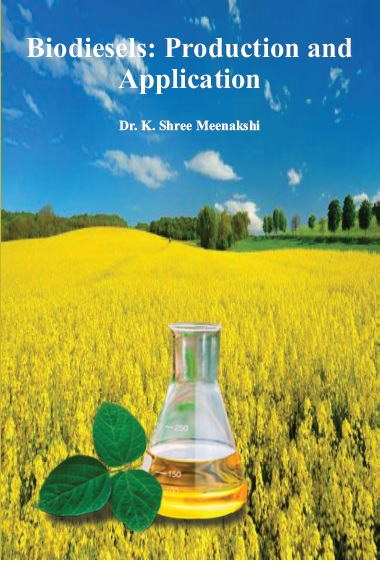SCIENCES AND ENGINEERING

Biodiesels: Production And Application
by Dr. K. Shree Meenakshi
ISBN Number : 978 - 93 - 91478 - 21 - 6
Authors Details
| Author Name | Image | About Author |
|---|---|---|
| Dr. K. Shree Meenakshi |  |
Dr. K. SHREE MEENAKSHI was born in the Madurai District of
Tamil Nadu. She received her Bachelor's Degree in Chemistry with
First Class from Madras University, Tamil Nadu. She obtained her
Master's degree in Applied Chemistry with First Class and Master of
Philosophy in Chemistry with First Class-Distinction from Anna University, Chennai, Tamil
Nadu. She has also received her doctorate from Anna University, Chennai by doing
extensive research in the eld of polymer nanocomposites and studying their suitability for
high performance aerospace and advanced engineering applications.
She has worked as a JRF (Junior Research Fellow) in DST (Department of Science and
Technology) project and she has received SRF (Senior Research Fellowship) from CSIR for
her contributions to advanced research. She has successfully completed several projects in
National Metallurgical Laboratory (NML), CSIR Complex, Taramani, Chennai. She has
presented her work in several national & international conferences and published her
research work in several reputed international journal of high impact factors. She writes
books with passion for the benefit of students and the research community. |
Book Description
Biodiesel is a clean-burning sustainable diesel fuel substitute made from vegetable oil and animal fats. The oil used to make biodiesel comes from the farm, not from oil wells. Since plants produce biodiesel by absorbing carbon dioxide from the air, it is a carbon-neutral fuel. Diesel engines today only remotely resemble the engine that Rudolf Diesel designed. His engine was initially designed to run on coal dust. Moreover, for the rst few decades, they could run on just about anything that would burn. Even as late as the 1970's, automotive diesel engines were extremely tolerant when it comes to the fuel they could use. Today's diesel engines are much more efcient and cleaner than the early versions, partly because they run on a narrowly dened diesel fuel. It allows the engine manufactures to tune the fuel system for improved efciency. Biodiesel and Diesel fuel are very similar in their physical and chemical characteristics. They are similar enough that modern diesel engines can run on biodiesel. Biodiesel can be blended with diesel fuel at any ratio. Blending biodiesel with diesel fuel results in a fuel that burns cleaner than diesel alone. Everyone has seen those black clouds, or soot, pouring from the exhaust of a diesel truck when it is under load. However, when we blend biodiesel with diesel, the soot is reduced, and dirty diesels can become clean diesels. The use of biodiesel in conventional diesel engines results in substantial reduction of unburnt hydrocarbons, carbon monoxide and particulate matters. Biodiesel is considered clean fuel since it has almost no sulphur, no aromatics and has about 10 per cent built-in oxygen, which helps it to burn fully. Its higher cetane number improves the ignition quality even when blended in the petroleum diesel. Biodiesel is emerging as one of the most attractive forms of biofuel. In addition to its role in reducing greenhouse gases and enhancing sustainability, biodiesel can also have a favourable impact on the properties of petro-diesel upon blending. It is well known that transport is almost totally dependent on fossil-fuels, particularly petroleum-based fuels such as gasoline, diesel fuel, liqueed petroleum gas (LPG), and natural gas (NG). An alternative fuel to petro-diesel must be technically feasible, economically competitive, environmentally acceptable, and easily available. The current alternative diesel fuel can be termed biodiesel. Biodiesel use may improve emissions levels of some pollutants and deteriorate others. However, for quantifying the effect of biodiesel it is important to take into account several other factors such as raw material, driving cycle, vehicle technology, etc. Use of biodiesel will allow a balance to be sought between agriculture, economic development, and the environment My sincere thanks to my mentors in Loyola College, Anna University, National Metallurgical Laboratory (NML) and National Aerospace Laboratory (NAL), CSIR for their constant encouragement in my research work.














